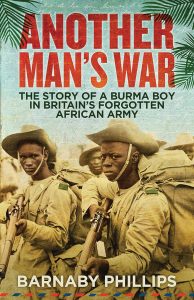Book Review by Olatoun Gabi-Williams

It is 1941. We are in the Yoruba town of Owo, a model colonial town in southwest Nigeria. Can you hear it? The British army’s bugle? It is blowing. Dispirited by academic scores too low for the exalted studies of his dreams, Isaac Fadoyebo is almost 18 when he joins the Royal West African Frontier Force. The army’s bugle has inspired a rush of hope for a bigger, more exciting life than he enjoys in Emure Ile, the village he lives in and in which he will fossilise—that much is clear—if he doesn’t sign up for World War II! Yes, he will support the British in their fight against Hitler—that German enslaver and his evil Reich. Amen to that. And yes, he will support the British unfailingly and with enthusiasm in their fight to save the world from all enslavers, including—when he and his colleagues are eventually told—the Japanese—”those” yellow savages” who have taken control of British Burma. He runs away to AbAbeokuta, where he swears the oath to King George VI, is conscripted, and receives a paramedic.
Phillips paints the war for imperial expansion with the finest strokes of a historian’s brush, applying dates, timings, and the names of people and places with the precision of an archivist dedicated to his craft. He goes further: into Great Britain’s struggles to hold on to her empire and drive out the Japanese, he weaves in the tale of a pre-existing conflict between the Arakanese Muslims and the Arakanese Buddhists. A conflict which was not resolved by 1945, when withdrawal by the Japanese signalled the end of the Burmese war, nor by the time of Burmese independence in 1948, This conflict has not only persisted in our world today, but it has also, since the Citizenship Act of 1982, escalated, leaving Arakanese Muslims—now the Rohingyas—tragically dispossessed of what they claim to be their native Burma. Through his presentation at close range of local hostilities and his presentation at close range of the imperial war between Japan and Britain, Barnaby Phillips shows the results of the local ethno-religious war, mirroring the results of the war between the two foreign powers. At the local level and at the global level, homelessness is the stark, fearful outcome for people of any place who lose to a powerful enemy in the fight to dominate their own turf.
The vaulting ambition that defines the British Empire and which will precipitate its fall is not conspicuous yet but look closely at those fortresses called protectorates and crown colonies; put your ears to the ground and you will hear fomenting anger and unrest and the rumblings of nationalism amongst the people.
They count among their ranks demobilised, distressed veterans of the war in Burma, the most notable being General China, a leader in the Kenyan rebellion of the Mau Mau.
Barnaby Phillips is not alone in paying overdue homage to the soldiers of West Africa who fought bravely in World War II at the Burmese Front. Biyi Bandele, the distinguished Nigerian author and playwright, has also paid tribute to the important contributions of his father, Solomon Bamidele Thomas, and the 500,000 soldiers of the King’s African Rifles and Royal West African Frontier Force who participated in the Burma Campaign. Bandele’s fictional account of Private Ali Banana of Orde Wingate & Chindits was published in 2007. The novel is entitled ‘Burma Boy, surely the only possible title other than the one chosen by Barnaby Phillips to document the same war.
In Phillip’s factual history, you will find not only a war litany of loss and pain but some nice surprises: the startling beauties of nature in the blackness of the Arakan jungle; unexpected honour in the ranks of British officers; acts of kindness from villagers of the Kaladan Valley; and one of eternal significance. But ultimately, it is for you, the reader, to judge whether the felicities that take place during the Burma Campaign, combined with the realities of demobilisation when it all comes to an end, justify the enormous sacrifices made by Private Isaac Fadoyebo and his comrades in another man—the coloniser’s war. To view “Burma Boy”, Phillips’ CINE Golden Eagle award-winning Al Jazeera documentary out of which “Another Man’s War” evolved, visit YouTube.
Publisher : Oneworld Publications; 2nd edition (September 15, 2015)
Language : English
Paperback : 336 pages
ISBN-10 : 9781780747118
ISBN-13 : 978-1780747118
Available at Amazon



